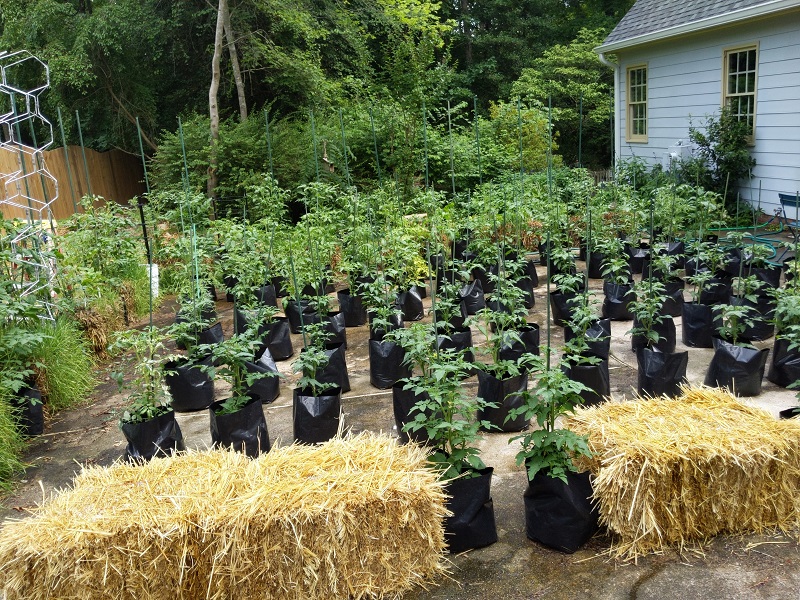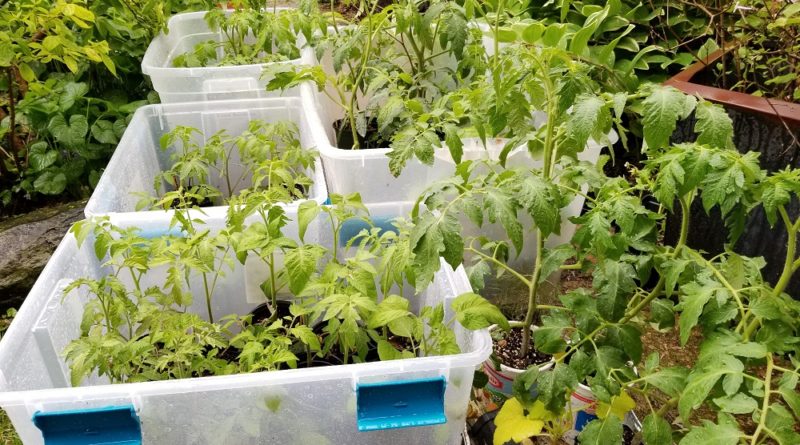TOMATOMANIA with KC and NC
Podcast: Play in new window | Download (Duration: 1:42:43 — 47.3MB)
Subscribe: Apple Podcasts | Spotify | Android | iHeartRadio | Podchaser | Email | TuneIn | RSS | More
A couple of tomato guys talking on the radio
(June 2, 2019) Ready or not, tomato growing season is here. I’m still expecting a snow event in the next couple of weeks, but I’ve put some of my plants in the ground. Which means that we need tomato experts to tell us what we’re doing wrong. So welcome to Mike’s TOMATOMANIA with KC and NC.
Allow me to clarify the title. The word “TOMATOMANIA” needs no explanation. I hope. But who or what are “KC” and “NC”?
Both, it turns out, are tomato experts. KC is short for KC Tomato, aka Keith Mueller. He was last on our show in July of 2018. Here’s what I wrote at the time.
He studied horticulture at Kansas State University, ended up studying plant pathology and working in the plant disease diagnosis clinic. He eventually went to grad school and studied tomato breeding, ending up at North Carolina State University as a research assistant for Dr. Randy Gardner, who was then one of the top tomato breeders in the world. He says that he was also tremendously influenced by plantsman J.C. Raulston.
This led to him starting a tomato webpage in 1994(!), which was the second webpage of its type on the then-infant Internet. It’s still up there at Keith’s Tomato Page and there’s a ton of great information on it. He even got introduced to tomato expert Craig LeHoullier (author of Epic Tomatoes) and they hit it off.
Well, lookee here! It’s a segue to our other tomato expert, Craig LeHoullier! Because his nickname is “NC Tomatoman,” he is the “NC” in this equation. Craig was last on our show more than two years ago. Here’s what I wrote then about the author of Epic Tomatoes: How to Select & Grow the Best Varieties of All Time.

I’m not an expert on tomato books, but Epic Tomatoes is a ridiculously informative, accessible and well photographed book about the fruit that is probably most Americans’ favorite vegetable. Yes, it’s a fruit, but must we really get started down that path?
LeHoullier’s book contains a list of 250 recommended tomatoes, which is stunning when you understand that until the middle or even late 19th Century, many people (especially in America) thought tomatoes were poisonous. It means that once the folks started hybridizing these puppies, they really went to town. One hundred fifty or sixty or seventy years later, we have thousands of varieties.
In his book, LeHoullier takes pains to write about everything you need to know about tomatoes: history, the best flavor, how tomato color happens, how to start from seed, how to grow, how to harvest, how to save the seeds, pests, diseases, and even how to mess with nature to create your own varieties. Oh, and some recipes, too. What’s not to like in a tomato book?
Fun fact: LeHoullier is the person who named the Cherokee Purple tomato.
So what will we talk about today on TOMATOMANIA? Uh…I don’t really know. I do know that we might draw from Craig’s blog, From the Driveway, where he writes about tomatoes and other horticultural topics. He recently wrote a three part blog about “The State of Heirloom Tomatoes in 2019.” You can read Part 1, Part 2 and Part 3 here.
Meanwhile, KC Tomato writes that he just signed on to a project to develop a participatory plant breeding network in the upper Midwest. The project will develop varieties for the upper Midwest specifically adapted for organic conditions. It will also create an online platform for trailing and data collection and train graduate students. He says that much of it will be done through the Seed to Kitchen Collaborative at the University of Wisconsin. The grant for the project comes through the Organic Seed Alliance.
Of course, since this is MY TOMATOMANIA, I will also insist on some simple tips for growing tomatoes in backyard gardens. Your questions are always welcome at 877-711-5611, and at Facebook, Twitter and Instagram.
Suburban Niles awarded for its 21st century snow and ice control
We just hit June, but don’t forget that we had snow on April 27, which was about a month ago. In other words, if you live in the Midwest, winter weather is either right behind you or just around the next corner. Which brings us to the the Chicago suburb of Niles. It recently received a national American Public Works Association (APWA) Excellence in Snow and Ice Control Award.
 How did they accomplish that? Recently the Public Works Department added two Road Weather Information System (RWIS) units. Those units use remote sensing equipment to gather and transmit road-related weather information. Now the department can collect data about atmospheric (temperature, wind, precipitation, etc.), roadway (temperature, pavement conditions, friction level), and sub-surface pavement temperature characteristics.
How did they accomplish that? Recently the Public Works Department added two Road Weather Information System (RWIS) units. Those units use remote sensing equipment to gather and transmit road-related weather information. Now the department can collect data about atmospheric (temperature, wind, precipitation, etc.), roadway (temperature, pavement conditions, friction level), and sub-surface pavement temperature characteristics.
But that’s just one piece of the puzzle. To get a clearer picture of how the Village of Niles addresses snow and ice removal, take a look at their APWA Award application. The village understands how toxic salt can be. So they limit its use in various ways.
One of those ways is to pre-wet the salt.
As shown in studies conducted by the Michigan Department of Transportation, treated salt stays in the target area of the road instead of bouncing off. The result is less salt is spread, saving money and reducing environmental impact. Second, prewetting salt provides the moisture needed to start the melting process. Third, when an organic based prewetting agent is used, it reduces the corrosiveness of salt, and fourth, boosts the performance of salt in all temperatures. The combination of all the items has allowed the Village of Niles to reduce salt application rates.
The village learned about the connection between pavement temperature and the effectiveness of salt. They added anti-icing, calibrated their equipment and optimized their routes. In the end, they decreased salt usage by 40%.
That’s just the tip of the iceberg, so to speak. The village is also proud of their bioinfiltration facility. It collects stormwater and reduces urban flooding. Fred Braun, Director of Public Works for the Village of Niles, joins us in studio this morning with more details.


